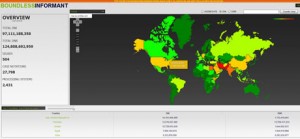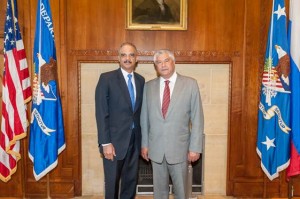Why Isn’t the NSA Evaluating Why It Didn’t Have Chechen Intelligence on Tamerlan Tsarnaev?
As I noted last week, four Inspectors General are conducting (an indefinitely delayed) review of their Agencies’ handing of intelligence in advance of the Boston Marathon attack. But just four Agencies are involved:
- Intelligence Community
- CIA
- DOJ
- DHS
That is, the NSA’s Inspector General is not participating in the review.
And while I understand that Tamerlan Tsarnaev’s domestic communications could not have been collected by NSA (and presumably none of the people from Dagestan and Chechnya with whom he had contact were selected as identifiers for the Section 215 dragnet), he still allegedly had contacts while in Russia with fairly prominent extremists. And there are two reasons why NSA might have collected Chechen contacts of Tamerlan’s: both because extremists in Chechnya have ties to al Qaeda (indeed, a number of them are and were fighting in Syria), and because Chechen mobsters have ties to the mobs being targeted under Obama’s Transnational Criminal Organization initiative.
So did the NSA have anything on the Chechens Tamerlan allegedly met with? In any case, wouldn’t it be worth a review of what they have and what they might have had?
Apparently not, at least according to the IC.
There is precedent for protecting the NSA from such retroactive scrutiny. Recall that the 9/11 Commission barely touched what files the NSA might have had.
[T]he 9/11 Commission, which went out of business in 2004, failed to conduct a thorough inspection of the government’s most important library of raw intelligence on al Qaeda and the 9/11 plot. And nobody appears to have inspected that intelligence since.
The archives, maintained by the National Security Agency at its headquarters in Fort Meade, Maryland, were reviewed—in a cursory fashion—only in the final days of the commission’s investigation, and then only because of last-minute staff complaints that the NSA’s vast database was being ignored.
Throughout its investigation, staffers complained, the commission’s leaders were fixated on what could be found in the terrorism files of the CIA and the FBI, the two big targets for criticism in the panel’s final report, and largely ignored the NSA, the government’s chief eavesdropping agency.
[snip]
“It’s always been frightening to me to consider what is still at the NSA, whatever we never had time to see,” said a former commission staff member, who now works elsewhere in the federal government and is barred from speaking to the press for attribution. “It’s kind of shocking to me that no one has tried to get back in there since. We certainly didn’t see everything at NSA.”
And I can imagine why, particularly after Edward Snowden started leaking, the NSA might not want to check whether it had data it simply missed. How embarrassing if it had to admit that it missed a terrorist because its haystack has gotten too big?
Still, given the allegations about Tamerlan’s entirely foreign associates, I’m not convinced the NSA would have collected nothing.
Keith Alexander today claimed NSA used the Section 215 database in the wake of the Boston Marathon attack (though how they claimed the allegedly self-radicalized Tsarnaev’s had ties to Al Qaeda, I don’t know) to chase down potential associates in NYC.
“We did use [Section] 215,” he said, referring to the Patriot Act provision that the government has claimed a federal court has agreed gives it the authority to collect data on practically all calls made in the United States. “We used it to support the FBI in their investigation.”
So the NSA was involved in the investigation, at least.
So can’t we have a teensy review to see if it did, and if our target selection in Chechnya and Dagestan and appropriate?


